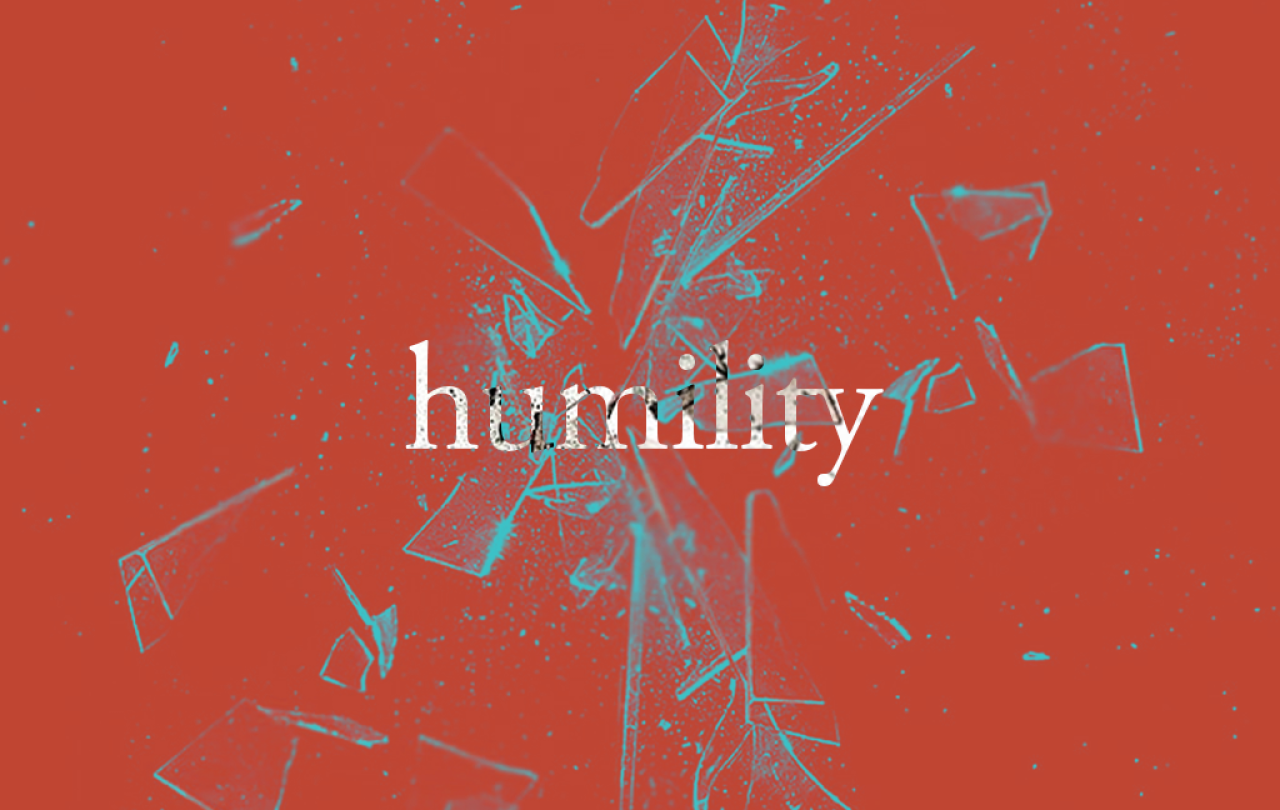
Misconceptions about humility
Humility is one of the most misunderstood virtues today. For many people it seems to imply either dishonesty – saying you’re bad at something when you know you’re good at it – or else a paradox, because how could someone who is humble know it? Wouldn’t that mean they’re not humble anymore?
Humility is an especially unpopular virtue for anyone who aspires to success. Surely humble people never make it to the top, because they’re always letting other people get ahead of them? Surely the people who make it to positions of power and influence are the ones who push themselves forward, loudly proclaiming their talents and abilities? Surely if you want to be a leader, you’d best not have the virtue of humility! A founder of a business once told me that their mentor gave them the advice that, if they want to have a successful business or career: ‘don’t be humble’. Being humble will ruin your chances of success. You have to reach for the stars if you want to succeed. You have to be the one who shouts loudest, who promotes your product or your skills as better than anyone else’s.
The best example of false humility is the kind of dishonest self-abasement that English culture often expects of you.
In short, we tend to think of humility as opposite to ambition, or at least a fatal handicap for anyone who is ambitious. But I suggest that the opposite is actually true: humility is absolutely essential for ambitious people. If you’re proud, then you will not struggle to improve yourself because you don’t think you need to. It’s only the humble person who is constantly seeking to improve because they’re aware of their shortcomings and how they can do better. So it’s rather the other way around: without humility, your ambition is doomed to failure.
In fact, all the above reservations are not really about humility. They might be about what we commonly call ‘false humility’. The best example of false humility is the kind of dishonest self-abasement that English culture often expects of you. My mother told me that when she was in school, she learnt that whenever someone complemented something you’d written or done, you’d have to reply ‘oh no, it’s not good, not at all.’ Or if they said ‘you’re really good at X’ you had to reply ‘no, I’m not’. That was part of the culture. And we British, because we love to think of ourselves as humble, also love to look down on Americans for being brash and shamelessly self-promoting. Those Americans are so arrogant – they think they’re great at everything. We don’t seem to be aware that our attitude towards Americans reveals the truth about our own self-opinion. We are very proud of being humble and we think that makes us superior to everyone else.
If we find ourselves looking down on others for not being humble, then surely something has gone wrong somewhere with our conception of humility. How do we recapture the essence of this virtue to stop seeing it as a hindrance, a paradox, or a handicap to success and instead see it as a practical and helpful tool to enable success?
A Judeo-Christian invention
The very idea that humility is a desirable character quality is an invention of the Judeo-Christian tradition. Humility does not appear in Aristotle’s list of virtues. On the contrary, Aristotle believed that one should seek to be raised above others, as superiority and honour were among the most enjoyable pleasures life had to offer. Humility was out of place and inappropriate for anyone of worth. As John Dickson writes, humility was for the lowest of the low, an attribute of the debased and crushed, “associated with failure and shame.”
All this changed in Western culture when it encountered Judaism and Christianity. To begin with, pride was identified as a flaw that sets you in opposition to God. Throughout the Old Testament, the arrogance of haughty rulers is condemned. For example, one of the great Old Testament prophets, Isaiah, wrote poetically:
The Lord Almighty has a day in store
for all the proud and lofty,
for all that is exalted
and they will be humbled.
Then in the New Testament, humility is praised as a virtue in stark contrast to the surrounding culture of the time. More than one New Testament letter encourages people to acquire humility, because ‘God opposes the proud, but shows favour to the humble’ – a loose quotation from the Old Testament book of Proverbs. Jesus himself tells his followers, ‘those who exalt themselves will be humbled, and those who humble themselves will be exalted’.
But what does this look like in daily life? I suggest the following points:
-
Being honest about your strengths and abilities without feeling superior because of them.
-
Being grateful for everything you have in life as opposed to thinking you deserve it.
-
Being slow to criticise and quick to praise others.
-
Being curious about things that are outside your normal concerns.
-
Taking an interest in other people.
-
Acknowledging our finitude and limitations.
We will unpack each of these in turn below.
Your worth is not measured by your abilities
Let’s begin with an example from the 19th century Danish philosopher Søren Kierkegaard. One of the most significant and groundbreaking philosophers of the 19th century, Kierkegaard never became famous in his lifetime. His writings only became famous long after his death, and while he was alive only one of his published books sold more than 500 copies. This is the crazy thing: Kierkegaard predicted that he would become incredibly famous after his death. In one of his journals he wrote this about Fear and Trembling, his most well known book:
‘Once I am dead – then Fear and Trembling alone will be enough to give me the name of an immortal author: then it will be read and translated into foreign languages.’
This sort of thing in his journals has led many people to think that Kierkegaard was incredibly arrogant and conceited. But I suggest that this judgment arises from the above-described misconceptions about humility. In fact, Kierkegaard happened to be right, and he knew the value of this book he had written even when none of his contemporaries did. Knowing that you are a genius who will become world famous and go down in history is not arrogance if you happen to be right about it! Kierkegaard had an accurate self-assessment. But what prevents this from being arrogance is simply this: he did not think that his unique talents made him superior to other people. He did not look his nose down on those who were not geniuses like him. He did not measure his own worth as a human being by his abilities. His concept of success did not have to do with intellectual, financial or worldly success at all. Success, for him, meant progress down the path of Christ-like virtue. Kierkegaard believed that no matter how great your competencies, they are only a useful tool – your faith is what makes you who you are and is the true focus of your identity.
Humility is not about underestimating your talents, but about accurate assessment of them that does not use them as a reason to feel superior.
Entitlement stifles gratitude
Humility is also about your attitude towards whatever privileges and comforts you have in your life. It involves being grateful for everything in your life that’s going well and focusing on all the things that you can be grateful for rather than all the things that are lacking in your life. Let me illustrate this with a quote by G.K. Chesterton (adapted for brevity):
All genuine appreciation rests on a certain mystery of humility. The person who said, ‘Blessed is the one who expects nothing, for they shall not be disappointed’, put it quite inadequately and even falsely. The truth is ‘Blessed is the one who expects nothing, for he shall be gloriously surprised’. The person who expects nothing sees redder roses, and greener grass, and a more startling sun. Until we see the background of darkness we cannot admire the light. As soon as we have seen that darkness, all light is lightening, sudden, blinding, and divine.
This sort of attitude is the opposite of what we call today a ‘sense of entitlement’. In the Western middle class world we have a strong sense of entitlement. We feel that we have the right to a well-paid and fulfilling job, a comfortable house, the best medical and healthcare, a secure pension, holidays abroad, a romantic partner and children if we want them. Our list of things we feel entitled to has grown very long indeed, and we feel shortchanged or mistreated if we don’t have any of these things. We could learn a thing or two from someone from a very poor nation in Africa who would be grateful beyond words simply to have a house and a job of any kind, and three meals a day. I’m not saying we shouldn’t strive for things like universal healthcare – that is obviously a good thing that everyone should have if anyone does. I’m just saying that we start from the wrong end if we come to expect such things as a default, rather than celebrate them as a wonderful gift and huge achievement.
Elsewhere in Chesterton’s writings we find this very short poem which encapsulates his own attempt to live this sort of gratitude and appreciation that starts by expecting nothing and then is delighted to be given anything at all.
Here ends another day
During which I have had eyes, ears, hands
And the great world round me;
And with tomorrow begins another.
Why am I allowed two?
This sort of not taking things for granted, which leads to a joyful gratitude for everything we have, is a practice that greatly helps us in cultivating humility. Gratitude helps us to see our privilege for what it is: not something we’re entitled to, but something we’re extremely lucky to have at all and something that other people don’t have even if they equally well deserve it.
Being slow to criticise and quick to praise
There’s a third aspect of humility that has to do with how we judge the achievements of other people: whether we are quick to point out their flaws, mistakes, and imperfections, or whether we look first for what we can appreciate and admire. We all know the kind of film or music critic who can be counted on to find something wrong with any movie or track you mention. Similarly, some food critics are hard to satisfy with any meal and can always find a way it could have been better. Perhaps the clearest example is with the way many conversations about politics run, as if those in the conversation know exactly what the government should have done, and if only those in power would listen to them, all our national problems would be resolved.
C.S. Lewis, whose life was devoted to literary criticism, wrote this about the nature of criticism (adapted for brevity):
I had not noticed how the humblest, and at the same time most balanced and capacious, praised most, while the cranks, misfits and malcontents praised least. The good critics found something to praise in many imperfect works; the bad ones continually narrowed the list of books we might be allowed to read. Someone experienced in good cookery, if they were humble, could praise a very modest meal: the dyspeptic and the snob found fault with all. Praise almost seems to be inner health made audible.
Curiosity beyond habitual concerns
But humility is not just about how we assess or judge things and people that are put in front of us. It’s also about what things we take an interest in in the first place. Curiosity is one of the virtues that supports humility. This does not refer to the nosiness that is always seeking gossip about things that aren’t your business. Genuine curiosity means taking an interest in whatever is put in your path, whether or not it feels relevant to your own concerns and ‘interests’ in the more technical sense. This is something that gets increasingly difficult the more fixed our careers and lives become in a particular professional direction. We lose interest in things that aren’t related to that professional field. The 20th century French thinker Gabriel Marcel put it this way:
As my life becomes more and more an established thing, a certain division tends to be made between what concerns me and what does not concern me …. Each one of us thus becomes the centre of a sort of mental space, arranged in concentric zones of decreasing interest and decreasing adherence, and to this decreasing adherence there corresponds an increasing non-disposability.
The kind of curiosity that supports humility means letting things interrupt these ‘concentric circles’ of interest: taking the time to learn about something that’s completely out of the way of your normal concerns. That’s really the only way to prevent the sort of professional deformation that comes with every profession: the blinkered way of looking at the world which only notices what is relevant to that profession and is unaware of how unimportant most of those things seem in the larger perspective of everyone else’s lives and the whole of society. And it’s only by remembering that larger perspective that we can prevent ourselves from accruing self-importance when we become particularly successful in our chosen careers. A professor of philosophy, or English, or history, or any subject really, can become a really big deal and a celebrity in the academic community of their own subject, and can become enormously self-important, simply because they’ve forgotten how small their own discipline is in the wider scheme of the academic world, and indeed how small the academic world is in the wider scheme of society. Thank goodness nobody at Oxford has this deluded sense of self-importance! Let’s remember Gabriel Marcel’s advice, and fight against the concentric circles of importance that make us disregard or show no interest in things that aren’t part of our chosen area of expertise.
It's really all about other people
But humility is not primarily about being interested in other things, grateful for other things, and ready to praise even flawed and imperfect things. It’s much more about being interested in and grateful for other people. It’s the interest in other people that’s the key here. The reason we misunderstand humility because we think of it primarily in terms of our opinion of ourselves and our abilities, and if other people feature at all, it is because we’re comparing ourselves to them somehow. But the whole point of humility is that it’s not about you at all. If you’re still focusing on yourself when thinking about humility then you haven’t grasped what humility is all about. True and real humility draws your attention away from yourself and towards other people. C.S. Lewis makes this point well (again, adapted for brevity):
Do not imagine that if you meet a really humble person they will be what most people call ‘humble’ nowadays. Probably all you will think about them is that they seemed a cheerful, intelligent person who took a real interest in what you said to them. If you do dislike them it will be because you feel a little envious of anyone who seems to enjoy life so easily. They will not be thinking about humility: they will not be thinking about themselves at all.
Humility does not need any paradoxical denial of your own talents, abilities or achievements. But what it does lead to is a reassessment of how important they are in comparison to other people’s talents, abilities, and achievements. Humility, in fact, makes the whole idea of comparing yourself to other people feel less of a worthwhile pursuit.
In the final analysis, humility is not really about you at all; it draws your attention towards other people, to take an interest in them and learn from them. The humble person is the person who takes the most interest in those around them, whoever they may be. There are so many reasons to do this and so many reasons this makes you a better leader. If you don’t think you can learn anything from the people you lead, then you won’t learn anything from them. If you imagine that leadership means having all the answers, and if you can never bring yourself to admit when you don’t know the answer or need advice or another perspective, then you are only increasing your chances of getting things wrong, badly wrong over time. If you think you’re ‘above’ the people below you, then you will miss out on all the valuable insights they have to offer.
The gift that humility gives is the ability to keep learning from everyone, no matter how different from you they seem, no matter how much less experienced, or ‘unimportant’ in society’s eyes. Even those you disagree with and think are badly wrong are potential sources of enormous learning and insight if you simply open your eyes to see what they can offer you. I’ve learnt more from taking seriously and listening carefully to people I disagree with than I ever learn from reading books, just because those kinds of people – the people on the other side of some controversial religious or political view – they challenge me and force me to see things in a new way, interrupting my normal patterns and channels of thought. Humility helps destroy echo chambers, throwing you out of the little cosy cocoon you’ve created for yourself, keeping you mindful of how many plausible ways there are of thinking about the world. And that is the only way your thinking can grow and change and develop.
Awareness of finitude
We are living in a time of increased polarisation in religion and politics. This takes the form of a pressure to take a particular viewpoint to its extreme, driven out of hatred of the opposing view and fear of looking even the tiniest bit like. There is no longer a ‘middle ground’ – a position that sees value in both sides and seeks to combine their strengths. If you try to take that position, people on both sides will denounce you as a traitor who is ‘really’ on the other side, or at least criticise you as heading down a slippery slope to the other side. The metaphor of a ‘slippery slope’ has a lot of currency in this discourse; it is by means of it people can warn against the dangers of seeing any truth at all in the opposite side’s position. Those on the left and those on the right, capitalists and socialists, republicans and democrats, brexiteers and remainers – each feels that the other side is pure evil, cannot be negotiated with any more than the devil, cannot be incorporated into a wiser, more balanced system: the only sensible approach is to shun it altogether, deny it any room or any voice or any validity. Concede nothing; never admit that the other side has a good point about anything; never admit weakness in your own side’s position; never act as if you still have something to learn. You have to act as if your own position is perfectly figured out, has no flaws, and moreover that the opposite side is completely ignorant, duped, and maliciously distorting the facts to fit their own ‘agenda’ (whereas your own side seems never to have an ‘agenda’).
This polarisation in Western politics has arisen from a crisis of humility, and it manifests as a judgmentalism and a refusal to listen that are rooted in an unconscious arrogance. We judge other people as either stupid, misguided, or evil and conniving, and in judging them that way we implicitly say that we are free of those same vices. We seem to think that we have attained an objective and provable position that is obviously the right one to any sincere person who’s willing to consider the facts neutrally. Even if we don’t ever say this or put it in that way, the manner in which we judge others reveals a lot about how we think of ourselves. Especially in academia, we are trained to write as if we understood things better than our interlocutors, and could pass judgment on them. We’re taught not to admit that we haven’t read X, or haven’t heard of X, or don’t know X: we’re taught to hide all of that and act as if we know more than everyone else and can judge everyone else right or wrong depending on how far they agree with us.
In philosophy, this attitude is described as a forgetfulness of the finitude of the human condition. Philosophy has a long and sustained discourse on human finitude, the finite limits of knowledge and thought. We can easily judge people from past ages because they had racist or sexist views, and we condescend to them by saying that ‘they were a product of their time’. But we don’t seem to apply the same logic to ourselves and realise that we are also a product of our time. The ethical views we consider important, the measures by which we judge other people lacking – those measures themselves are products of our own age, and we can be sure that future ages will judge us for things just like we judge past ages, for crimes we were not aware we were committing. We all have the opinions we have, not half so much because we have independently thought about it and arrived at the correct view, as simply because we were born and raised in this century, in whatever place in the world we were born and raised, and we went to this or that school and were taught these particular ideas, and accepted those ideas as true, just like everyone else in the world who believes things radically different to us.
Acknowledging and accepting our finitude means recognising the contingency and provisionality of our own viewpoints, however strongly we hold them and however important we think they are. Recognising the provisionality of our political or religious views means realising that we are deluded if we think we’re certain we’re right. Certainty is not available to finite human beings. Awareness of finitude means realising you can never be certain you’re right. You might challenge me by asking, ‘are you certain of that?’ No, I’m not – that would be self-contradictory. But I believe it is true all the same. I don’t believe the pursuit of certainty is a wise use of time, and I believe claims to certainty are deluded. But of course, I might be wrong: that’s part of the point of humility. We all need to recognise that we might be wrong. We have no better reasons for holding our political and religious opinions than other people have for holding theirs.
Only when we recognise this we can open our minds to listening to other people and learning from them. And it’s only when we listen to other people and take their views seriously on their own terms that we have a chance of learning where we might be wrong, or of finding confirmation that we might be right. It’s a highly important form of leadership that is called leading by example. If we want someone else to take our views seriously and listen carefully to find out if we’re right, why don’t we take the lead and start by doing them the favour? Then perhaps they’ll follow our lead and listen to us in turn, and then perhaps we’ll have some real dialogue instead of polemical denunciations, judgments, and counter-denunciations.
So I think humility has real practical value and is urgently needed in our own time to heal some of the wounds that currently divide our world.











